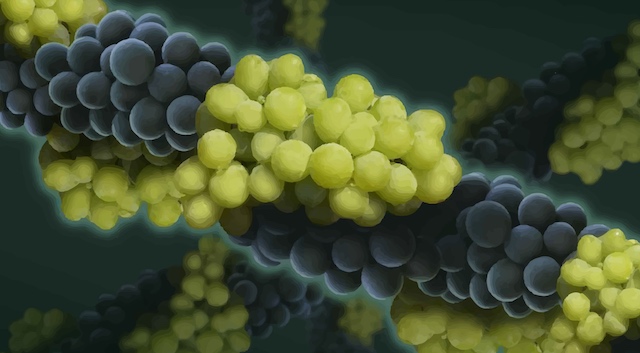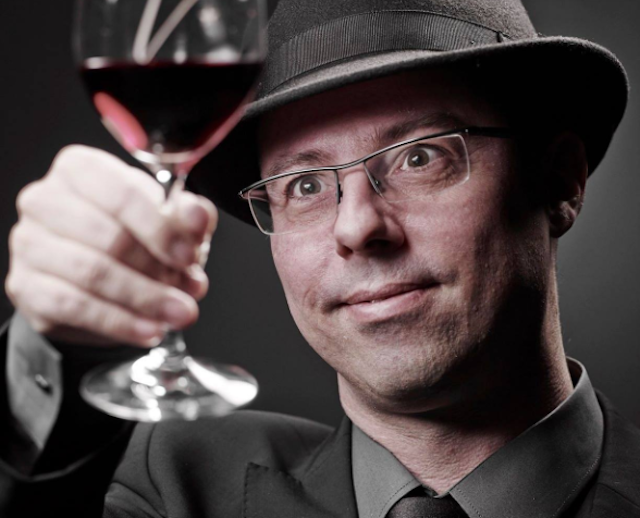Posted: Jun 18, 2019

Dr. José Vouillamoz is perhaps one of the most influential researchers in grape genetics today. His work is changing the approach viticulturalists, and winemakers are taking to understand how DNA profiling, grafting, hybridization and Crispr/Cas-9 will impact the future of our marketplace.
This is the transcript of the interview conducted with Dr. Vouillamoz by the President of Go-Wine.com, Luis Torres and Robert Scott of Wine Line Radio. It will be run as a series on Go-Wine.com this week. Enjoy the podcast here.
Wine Line RadioWelcome to Wine Line TV and Wine Line Radio. This is your host Robert Scott. And today I'm very excited. We have with us two prominent people in the wine business. First is Dr. Vouillamoz. He is arguably the leading grape geneticist for the wine industry. We also have my good friend and collaborator Luis Torres who is President of the Wine Business Academy and also the founder of Go-Wine.com. Today should be very interesting.
Wine Line Radio
Good morning gentlemen.
Dr. Vouillamoz
Good morning.
Go-Wine.com
Good morning Robert. Thank you for generously offering us your time this morning on Wine Line TV and Wine Line Radio. Before we begin thank you Dr. Vouillamoz for being with us today.
I had the pleasure of listening to you present at the Climate Leadership Conference in Porto this past March. It was very inspirational. You covered a lot of material in a very short amount of time. I’m glad to speak with you again.
Dr. Vouillamoz
Thank you. Thank you very much Luis. Well, I had to leave some space to Al Gore for speaking.
Go-Wine
That's right. I think he needed a little more time. Yes. (All chuckle)
Go-Wine
It was a very effective conference and the information that was derived from that is incredible.
For those of you listening, just to let you know about our format today we're going to be interviewing Dr. Vouillamoz with a back and forth Q and A between Robert Scott and myself. We look forward to this exceptional content from Dr. Vouillamoz.
Please tell us in a couple of minutes a little bit about your trajectory and your curriculum?
Dr. Vouillamoz Photo credit: Sedrik Nemeth
With pleasure. My name is Dr. Joseph Vouillamoz. I'm from Switzerland. I'm a biologist, grape geneticist, and I was trained at UC Davis in grape genetics and DNA profiling with professor Carole Meridith. In my career I've had many women leaders that impacted my career in an important way. The other one is obviously Jancis Robinson MW with whom I collaborated on the Oxford Companion of Wine on the World Atlas of Wine and after a few years of collaboration we started a huge task which was the writing and publication of Wine Grapes, the ultimate reference on all the grapes that are cultivated in the world.
Go-Wine.com
We are honored to have you share your legacy with us. Today we will be closing with more information on your book Wine Grapes. We can't wait to get to that.
Go-Wine.com
Today, I wanted to go through a pyramid of questions for you.
According to your business profile you conduct DNA profiling for your customers and for many of us we have to kind of walk before we run on this subject because we're new to it or have varying levels of expertise. We were wondering how does DNA profiling help winemakers and viticulturalists be more successful in their businesses?
Dr. Vouillamoz
It can help them in many ways, many different ways.
First of all, when a wine maker has an unidentified variety in the vineyard it's always important to know what they are cultivating because it can affect the taste of the wine. This is the first step.
The second step is when you have to replant a vineyard if it's a brand new one and for example, you would like to plant Syrah.
It happened to us in California many years ago. A producer wanted to plant 10 or 20 hectares of Syrah and he got material to plant it and he was suspicious about it, so he gave it to us, we analyzed it and we advised him, “it's not Syrah that you're planting, it’s something else."
As a result we saved him a lot of time and money by identifying very early in the process what he was going to plant and what was wrong. If you have a very old vineyard with different varieties and you want to replant it in a similar fashion you need to know exactly what you have in the vineyard. So, we help also by maintaining the diversity the biodiversity in the vineyards.
Go-Wine.com
That's fantastic.
Are there a lot of situations where they think they're planting one variety and in fact they're planting something else?
Dr. Vouillamoz
I would not say a lot, but it can happen especially in the New World, not as much in the Old World.
In Europe they are more trained in identifying varieties visually. But we must consider that in nurseries and also in grape collections we have between 3 and 4 percent of mistakes, mislabeling, or human errors that can happen. So, with DNA profiling for example we can solve these mistakes.
Wine Line Radio
Let me jump in here and just ask a question. You use genetic DNA markers to identify these vines as one would do in identifying the historical data of a person.
Can you take us through that process a little bit? How do you collect samples from the vine itself in order to identify these markers?
Dr. Vouillamoz
You can collect DNA from almost any part of the vine that you want but the most convenient for me is to collect the tiniest leaves. The tiny leaves that are very young contain a lot of DNA.
So, then you dry this leaf and you go through an extraction process to extract the DNA and then we look at specific portions of DNA that will be unique to the variety but that will be different from another.
It's just like for human beings. We all have a single unique DNA profile that is different from your brother or from your neighbor or from anyone else, but in all your body your DNA is unique. It works identically in the case of the vine.
Wine Line Radio
That is very interesting to me because I recently, in fact last Father's Day, I was given a gift of a DNA analysis for my history. For the past 70 years or so I have had this distinct knowledge through contact with other family members that my DNA was primarily Scottish. However, the results came back as 87 percent Northern European which I guess supposes that the Vikings made their way into Scotland at some point. I thought that was very, interesting and I'm sure that this kind of unique discovery on your part can be very telling for the producers of the wine grape.
Dr. Vouillamoz
Yes of course. The human ancestry analysis that has achieved a commercial purpose in recent years provides you with a general picture of where your DNA comes from. It's not that specific however.
If you want a specific study of your family tree through DNA it's not that easy because you need to have a written agreement of every person that you will analyze the DNA of. If you want to be more precise you need to obtain a comprehensive collection of background DNA information from many family members.
Dr. Vouillamoz
For the grape varieties we apply the same technique and the discoveries can be fascinating when you understand that a vine in one place is the same as a variety in another place. You understand the migration of the people and also the culture’s viticultural practices. This combines genetics to history.
Go-Wine.com
Genetics and history recently revealed some important information on grape origins. The new research published in Nature Plants on the findings of ancient DNA was significant. The results were run all over the globe in the major publications. What do you think were the more significant revelations in those findings in your opinion?
Dr. Vouillamoz
Well I find this new research fascinating. I'm almost jealous I was not part of it, to tell the truth. I had the same idea more than 15 years ago using the same technique, but it was not developed enough. Back then it was way too expensive. They were using what we call SNIPS. It's single nucleotide polymorphisms so it looks at the variation in one single molecule in the DNA that you're looking at. And this is what they have used for these archeological samples coming from France. And the result for me is really, fascinating and amazing because they were able to find one grape pip in Orléans in central France that is identical with the modern grape called savagnin blanc that is used to make the Vin Jaune in the Jura.
We knew that this grape was probably very, very old, but we always had doubts because if you read an ancient document of the Middle Age period and it said “savagnon” or something similar. You could not be a hundred percent sure that it was exactly the same as the savagnin we are still cultivating today. It could have been the ancestor, the cousins, the brothers or sisters.
Now we know that it was exactly the same as what they were cultivating 900 years ago at least. This is a groundbreaking discovery.
Go-Wine.com
That is fascinating. Here in the States we don't focus that much on Vin Jaune and the savagnin blanc. A lot of people immediately confused that with sauvignon blanc.
Go-Wine.com
Where do you see the future going with this discovery?
Dr. Vouillamoz
I wish that they would expand their research to other archaeological sites all over the ancient world. I myself come from Switzerland where we have many grape remains. We have grape pips coming from archaeological sites that are even older than what they had. Some of them date back to 800 years before Christ. It would be super fascinating to analyze the archeological remains in the rest of Europe and also in what we call the cradle of viticulture in the Near East as well as archaeological sites in eastern Turkey, Armenia, Georgia and also Iran. These are places that I have already visited and have studied together with Professor Patrick McGovern who is an archaeologist that is specialized in analyzing the remains of wine traces in the trials that are found in the artifacts that are found in archaeological sites. And now with this technique we could we could discover fantastic results.
We will continue with part II of this article on June 19, 2019 where we will cover gene editing, ancient grapes and more.
Transcription by Go-Wine.Com
June 18, 2019
Source: Go-Wine.com
Grape DNA Picture Source: Josevouillamoz.com
Go-Wine's mission is to organize food and beverage information and make it universally accessible and beneficial. These are the benefits of sharing your article in Go-Wine.com


The Wine Thief Bistro & Specialty Wines is a locally owned small business in downtown Frankfort, IL offering world class wines in a relaxed, casual gathering spot for friends and family. Offering world class virtual tastings and touchless carryout.
https://www.twtwineclub.com/aboutus
Go-Wine 25 Great Wineries in US selection prioritizes quality, value and availability.
www.go-wine.com/great-wineries-in-america
Tasting wine is a nice experience, but visiting the places in which wine is made is a magic moment. Available in New York City for touchless pickup.